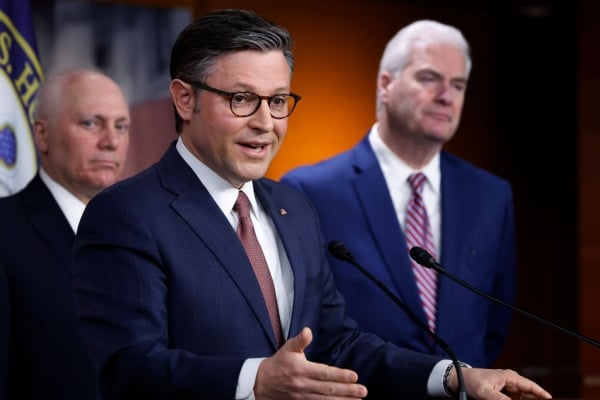As Republicans on Capitol Hill look to potentially spend billions on mass deportations, tax cuts and other Trump administration priorities, the House GOP is hunting for ways to save money elsewhere. But some of the slashes they’re suggesting could harm colleges, universities and the students they serve, higher ed advocates say.
Potential cuts could include repealing Biden’s student loan forgiveness and repayment plans, increasing the scope and rate of endowment taxes, requiring colleges to help pay back student loans, and establishing penalties for colleges that violate Jewish students’ civil rights, according to a list released Jan. 17 by Punchbowl News.
Higher ed policy experts cautioned that the list is in flux but said it offers a good idea of what’s on the table for potential cuts.
Over all, the list includes nearly $13 trillion in potential savings over the next 10 years, though some of the items on the list still lack cost or savings estimates and some of the estimates are considered informal. Of that, $2.1 trillion comes from provisions that in some way impact higher education, according to a list from the Association of Public and Land-grant Universities.
“There are a number of proposals on the menu that would be harmful for students and institutions of higher education that have made great progress in bringing costs down. So we’re concerned,” said Craig Lindwarm, APLU’s senior vice president for governmental affairs.
The potential cuts are part of a special legislative process called reconciliation, which can be used once a year to quickly advance high-priority—and often controversial—pieces of legislation. Unlike traditional bills, a reconciliation act isn’t subject to the 60-vote filibuster threshold and only requires 51 votes to pass the Senate, giving a party with a narrow majority a higher likelihood to pass its priority issues.
But there’s a catch: All policies included in reconciliation must involve the budget or taxes, and for every new dollar spent under the omnibus bill, the same amount must be cut somewhere else. A nonpartisan congressional staff member, known as the Senate parliamentarian, decides whether each provision meets the rules and can be included in the bill.
Congress is aiming to pass the reconciliation act by Memorial Day, policy experts say, though there is a lot of work to be done before the legislation reaches the Oval Office. For now, the list, which Punchbowl says comes from the House Budget Committee, provides a menu of offset options lawmakers are considering and lobbyists will be advocating to prevent cuts that hurt the organizations and communities they represent.
Associations representing higher ed institutions and consumer-focused think tanks say that though there may be a few wins on the spending front—such as allowing students a second chance at avoiding loan default and capping the amount of interest that could be paid within a loan repayment—the cuts up for consideration cause a higher level of concern.
“When everything is taken all together, the harmful ideas outweigh the positive ones,” Lindwarm said.
At the same time, conservative lawmakers and policy experts say spending cuts should be a top priority and that the provisions up for consideration are sensible expectations for higher ed.
“We have to have a top line for our budget reconciliation,” Representative Tim Walberg, a Michigan Republican and chair of the Education and Workforce Committee, told WSJM, a local radio station. “We’ve been working to reduce unnecessary spending, to start putting ourselves back in line and on track.”
Preston Cooper, a senior fellow at the American Enterprise Institute, a conservative think tank, made similar remarks, adding that, “for the most part, the cuts are pretty reasonable and could actually be beneficial for students.”
Accountability or Unfair Burden?
One possible savings measure that Cooper described as a benefit for students is the very one that college lobbying groups said posed the greatest threat—risk sharing.
Resurrected from the College Cost Reduction Act, a sweeping higher ed overhaul bill that was proposed in the last Congress but didn’t move forward, the provision would require postsecondary institutions to make annual payments based on their graduates’ unpaid loans. Colleges would have to pay the surcharge in order to continue participating in the federal student loan program.
“This will not only save taxpayers money, but this will help students, because it’ll give colleges an incentive to stop loading students up with debt that they are never going to be able to repay and start offering programs with a better return on investment,” Cooper said.
But Emmanual Guillory, senior director of government relations at the American Council on Education, disagreed. He said that the institutions he represents are not opposed to increasing accountability, but they don’t believe the risk-sharing policy as proposed would be effective. Rather, they think the provision would discourage colleges from welcoming low-income students and promoting career tracks with high demand but lower income, like teaching and other public service jobs.
“We want to be mindful of what these policies are and the impact that they will have on the higher education community,” he said.
Lindwarm of APLU echoed Guillory, saying, “There are alternative approaches to transparency and accountability that would be a lot more fair and effective.”
Guillory hopes that since the provision saw little movement in both the House and the Senate last year, it’s unlikely to be part of a final reconciliation package. But Cooper noted provisions like risk sharing could stand a better chance of passage in reconciliation than as stand-alone bills.
“The reason is that this is tied to the extension of the 2017 tax cuts, which is a major Republican priority,” he said.
Republicans also are looking to build on their efforts from the last Congress to hold colleges accountable. The first would penalize any institution that doesn’t properly respond to campus protests and violates Jewish students’ rights under Title VI of the Civil Rights Act. The second would increase endowment taxes and the number of universities they apply to.
Currently, the 1.4 percent tax on net investment income impacts about 50 institutions that have at least $500,000 in assets per student. Under the reconciliation proposals, the tax rate would jump to 14 percent and include about 10 more institutions.
Altering Borrower Behavior
Although college and university advocacy groups are some of the organizations raising the most concern about the proposals, student advocacy groups have also voiced concern. And some of the potential cuts are tied to consumer protection regulations put in place by former president Joe Biden, making them all the more likely to be included in the final bill.
Some of the policies experts anticipate could be at the top of the slash list are those regarding direct student loan forgiveness and more generous income-driven repayment plans. Republicans have also discussed capping graduate student loans, sunsetting certain loan programs like Grad and Parent Plus, or tightening access to Public Service Loan Forgiveness. Experts like Guillory say both the repeals and the new policies could affect students and the colleges they attend.
“Those types of proposals will likely alter student behavior and whether or not they can access postsecondary education,” he said, explaining that as the amount and cost of loans go up, enrollment could go down. “The whole point of the Higher Education Act was to increase access to postsecondary education … Student loan debt is an issue, and we need to address college affordability. But how do we go about accountability in ways that are meaningful and impactful?”
Other cuts on the table include more long-standing, though still contested, loan protection measures such as Biden’s regulations that offer relief to borrowers who attended colleges that closed or who were misled by their institutions. While consumer protection advocates say rescinding these policies could harm students, groups like ACE and APLU are not opposed, saying the move would allow agency officials to go back to the drawing board and get more input from colleges.
Regardless, it seems there’s little chance that either cluster of Biden’s regulations will be saved. In fact, the GOP could use multiple avenues to rescind Biden’s work—one of which is through executive orders. But congressional Republicans have asked Trump to hold off on rolling back policies by executive action so that they can count the savings in their budgeting bill, Punchbowl reported.
So student advocacy groups are trying to be selective about when they spend time pushing back against the reconciliation proposals versus when they decide to work ahead and try to establish new protection measures elsewhere.
For example, Michelle Dimino, education program director at Third Way, a left-of-center think tank, said that her organization is advocating for Trump’s Department of Education to consider a new income-driven repayment plan, even though it may not be as affordable as Biden’s. Third Way is also pushing to ensure that if graduate student loan options dwindle, new guardrails are put up around private loans.
“When it’s things like borrower defense, closed school discharge and Public Service Loan Forgiveness, those are things that we actively advocate to maintain,” Dimino said. With some of the other proposed cuts, like to Biden’s income-driven repayment plan, “it’s just about recognizing that these are very likely to happen, and asking, ‘Does everybody involved have the best possible sense of what the consequences of that would be?’ That way, if they go that route, there are other plans in place to make that as reasonable, sustainable and protective an environment for students as possible.”








